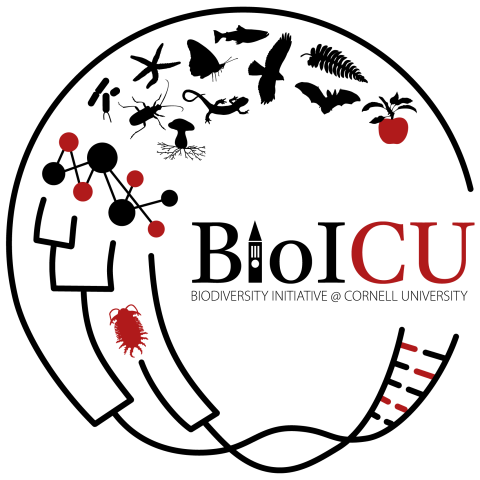Teaching

Courses that support Biodiversity Literacy at
Cornell University
- Biological Sciences Major
- BIOEE 1780 – Introduction to Evolution and Diversity
- BIOEE 1610 – Ecology and the Environment
- Biodiversity and Systematics Concentration: Biodiversity encompasses the study of the variability within species (genetic diversity) and among species (species diversity) of all living and fossil organisms and their environments (ecosystem diversity). Systematics is the scientific study of the diversity of living organisms and of the relationships among them. As such the field spans a broad range of related areas, including phylogeny, evolution, and classification. The concentration in Biodiversity and Systematics is designed to introduce students interested in the diversity of the living and extinct world. Courses particularly focusing on biodiversity include:
- BioEE 2640 – Tropical Field Ornithology
- BioEE 2740 – The Vertebrates: comparative anatomy, function, paleontology and evolution
- BioEE 4700 – Herpetology
- BioEE 4750 – Ornithology
- BioEE 4760 – Ichthyology
- PLBIO 2300 – Global Plant Biodiversity and Vegetation
- PLBIO 2410 – Introductory Plant Diversity and Evolution
- PLSCI 2430 – Ecology and Evolution of Plants
- PLBIO 2470 – Plants and Cultures around the world
- PLBIO 2480 – Vascular Plant Systematics
- PLBIO 4480 – Plant Evolution and the Fossil Record
- ENTOM 3310 – Insect Diversity and Evolution
- PLPPM 3190 – Mushrooms of Field and Forest
- PLPPM 4300 – Mycology
- Ecology and Evolutionary Biology Concentration: Ecologists study the interactions between organisms and their environments, and the consequences of those interactions for individuals, populations, communities, and ecosystems. Evolutionary biologists study the history of organisms and the processes that have resulted in adaptation, phenotypic variation, and biotic diversity. Ecology and evolutionary biology are interdependent fields that both rely on a deep understanding of the diversity of organisms, their physiology and anatomy, and how they are modified through natural selection, which is why biodiversity/organismal biology is the third pillar of the EEB curriculum.
- BioEE 3610 – Advanced Ecology
- BioEE 4460 – Plant Behavior and Biotic Interactions
- BioEE 4550 – Insect Ecology
- BioEE 4560 – Stream Ecology
- BioEE 4780 – Ecosystem Biology and Global Change
- BioEE 4530 – Speciation: genetics, ecology and behavior
- BIoEE 4000 – Ecology and Evolution of Infectious Disease
- NTRES 3100 – Applied Population Ecology
- BioEE 2525/6 – Ecology and Conservation of Wildlife in the Neotropics (includes Field Component)
- BioEE 2527 – Neotropical Wildlife Biology
- Biodiversity and Systematics Concentration: Biodiversity encompasses the study of the variability within species (genetic diversity) and among species (species diversity) of all living and fossil organisms and their environments (ecosystem diversity). Systematics is the scientific study of the diversity of living organisms and of the relationships among them. As such the field spans a broad range of related areas, including phylogeny, evolution, and classification. The concentration in Biodiversity and Systematics is designed to introduce students interested in the diversity of the living and extinct world. Courses particularly focusing on biodiversity include:
- Environment and Sustainability major: Interdisciplinary approaches are needed to sustainably resolve the biodiversity crisis. The Environment & Sustainability major spans perspectives needed to build a world with more sustainable environmental conditions that directly and indirectly mitigate biodiversity loss. As a cross-college major in CALS and Arts & Sciences, E&S brings together students and faculty with diverse skills and common purpose.
- NTRES/ENVS 1101 – Understanding environment and sustainability
- NTRES/BSOC 2201 – Society and Natural Resources
- AEM/ENVS 1500 – An introduction to the economics of environmental and natural resources
- NTRES 3110 – Fish Ecology, Conservation and Management
- NTRES 4100 – Advanced Conservation Biology: Concepts and Techniques
- Field Courses: Here we call out field courses that can fit into either the Biological Sciences or the E&S majors
- NTRES/ENVS 2100 – Introductory Field Biology
- BioEE 2525/6 – Ecology and Conservation of Wildlife in the Neotropics (includes Field Component)
- BioEE 2527 – Neotropical Wildlife Biology
- NTRES/ENVS 2400 – Field Methods in Avian Ecology
- BioEE 3611 – Field Ecology
- NTRES/ENVS 3260 – Applied Conservation Ecology
- Courses offered at Shoals Marine Laboratory (summer, off campus)
- BIOSM 2500: Coastal Habitat Field Research Methods
- BIOSM 3330: Marine Parasitology and Disease
- BIOSM 3340: Marine Invasive Species
- BIOSM 3450: Marine Mamman Biology


